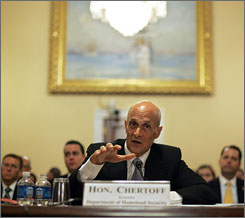Opinion Columns of the Libertarian Left
Here’s some Halloween treats for radicals who have been working for alliance between left-friendly libertarians and anti-authoritarian Leftists. These are all articles that have appeared over the past week Alexander Cockburn and Jeffrey St. Clair’s anti-imperialist Left magazine CounterPunch:
James Bovard (2007-10-27): Breaking Down an Innocent Man: The FBI’s Right to Threaten Torture
Jacob G. Hornberger (2007-10-27): Ruling by Decree: The Fraud of the War on Terror
Sheldon Richman (2007-10-31): President Busybody: Bush has Time to Run the World
Jacob G. Hornberger (2007-11-01): The War on Telephone Privacy: The Meaning of the Nacchio Case
One of the things that I’m especially pleased about with Hornberger’s article is that it’s not just a column covering some point of substantial pre-existing agreement between committed libertarians and committed Leftists (anti-imperialism, civil liberties, etc.). The article has that, and that kind of thing is very important and very valuable. But Hornberger’s article goes even further; not only is he crossing the bridges that are already there, but he is also building some new ones. One of Hornberger’s main analytical claims has to do with the way in which the bureaucratic State’s pervasive and byzantine regulation puts tremendous coercive power into the hands of the Stasi, and the way in which the State’s regulatory carrots and sticks serve to keep the interests of big business and the State firmly aligned:
First, as we have long pointed out, the real value of the regulated society is not any protection it provides to people. All that protection talk is just a sham. The real purpose of the regulated society is to keep the business and banking community in line — meaning in conformity with federal policy. The real purpose of the rules and regulations is to serve as a Damocles sword, ready to fall on any business or bank that refuses to go along with the feds.
… Of course, the feds would argue that the law is the law and that Nacchio broke it and therefore has to pay the price. That, of course, is not the point. The point is that in the regulated society, everyone breaks the law, one way or another, which then provides the feds with the option of prosecuting anyone they want whenever they want.
Consider, for example, the IRS code. Despite never-ending railing among political candidates about how complex the code is, the feds love the complexity. Why? Because they know that no one can ever file a perfect income-tax return and especially not wealthy and influential businessmen. If the feds looked hard enough, they could prosecute anyone they wanted at any time for income-tax violations.
It’s the same with insider-trading laws, Sarbanes-Oxley, hiring illegal aliens, or a multitude of other economic crimes. If they hadn’t gotten Nacchio on insider trading, they would have undoubtedly gone after him for other things. The point is, he refused to go along with illegality and wrongdoing, and they went after him for it.
To add insult to injury, President Bush and some of his federal cohorts in Congress are seeking to give civil immunity to the telephone companies that allegedly chose to become federal informers. They are trying to get Congress to pass a law that would prohibit the customers of the telephone companies from suing for the companies’ allegedly wrongful (and cowardly) misconduct.
In other words, become a federal informer and we’ll protect you. Refuse to do so, and we’ll send you to jail.
What is the difference between neighborhood captains in Castro’s Cuba, who report people’s activities to their government, and U.S. telephone companies who report people’s activities to their government? Don’t they all rationalize their conduct under the same warped sense of
patriotism?— Jacob G. Hornberger (2007-11-01): The War on Telephone Privacy: The Meaning of the Nacchio Case
When libertarians challenge the regulatory State, well-intentioned Leftists will often point to all kinds of sharp dealing, exploitation, and irresponsible behavior that big business engaged in prior to the massive expansion of government regulation during the Progressive and New Deal eras. The case for this is often impressionistic and overstated, and usually glosses over the way in which byzantine State regulations allow for new kinds of market-cornering, agency-capturing, sharp dealing, and legal insulation from corporate responsibility. But too many conventional libertarians miss the point by responding with little more than apologia for big business. The right response is to point out that there is more than one way to deal with nasty business practices. The question is whether the means are going to be coercive or voluntary. Coercive solutions tend to deal with the problem from the top down, through a class of professional bureaucrats; voluntary methods tend to favor dealing with these problems from the bottom up, with you and your neighbors working together in grassroots efforts like fighting unions, organized boycotts, consumer associations, mutual aid societies, or watchdog pressure groups.
The grassroots approach puts power into the hands of ordinary people, who enjoy a lot of choice over what causes to support, how to organize responses, when to participate, when to withdraw, and so on. The bureaucratic approach takes power out of the hands of ordinary people and puts it in the hands of professional lawyers and bureaucrats; it tries to fight the unaccountable power of Behemoth by building up the unaccountable power of Leviathan. But the State has its own reasons for doing what it does, and it’s extraordinarily hard, indeed practically impossible, to keep those reasons aligned with anything like ordinary people’s real interests or concerns. Business and government simply get involved in elaborate power plays, as each tries to convert departments of the other into a captured agency for their own purposes, variously using the tools of campaign contributions, front groups, astroturf, cronyism, tax breaks, tax revenue, regulation, prosecution, extortion, and other forms of mutual back-scratching and mutual terrorizing. This is exactly what happened with the government’s successful efforts to turn telecom companies into multibillion dollar snitches for the Securitate creeps; as usual, the end result is that they all get in it together against the rest of us. That’s not an unhappy accident; it’s the way it’s always going to be as long as State agencies can arrogate power that individual people cannot opt out of.
All power to the people; the bureaus can go to hell.

